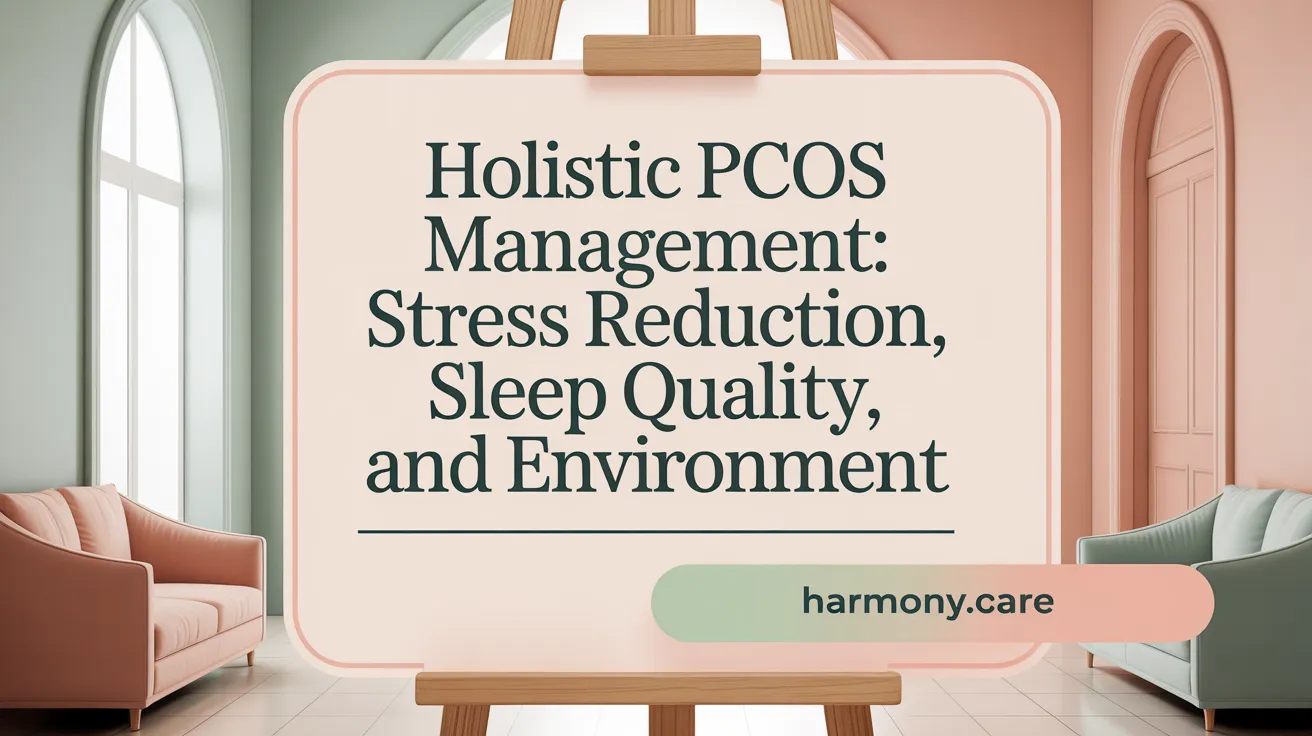Understanding PCOS and the Promise of Natural Management
Polycystic ovary syndrome (PCOS) is a prevalent hormonal disorder affecting millions of women worldwide, marked by symptoms such as ovarian cysts, irregular menstruation, acne, hair thinning, and weight gain. The complex interplay of insulin resistance and hormone imbalance lies at the heart of PCOS, presenting challenges for effective management. While no cure exists, emerging evidence highlights how natural methods, primarily through lifestyle and dietary interventions, can significantly alleviate symptoms and improve quality of life. This article explores evidence-based natural strategies that support hormone regulation, insulin sensitivity, and symptom control for women living with PCOS.
Dietary Foundations: Whole Foods and Balanced Nutrition

Why are whole foods important for managing PCOS?
A diet rich in whole foods like fruits, vegetables, whole grains, and legumes plays an essential role in supporting hormone regulation and managing PCOS symptoms. These foods help stabilize blood sugar levels and provide vital nutrients without the added sugars or preservatives that can exacerbate insulin resistance and inflammation commonly linked to PCOS.
How does balancing carbohydrates and proteins affect PCOS?
Balancing carbohydrate intake with adequate protein is crucial for women with PCOS. Emphasizing complex carbohydrates alongside healthy proteins—especially plant-based ones like nuts, legumes, and whole grains—can improve insulin sensitivity and hormone balance. This balanced approach helps maintain energy levels and supports more regular menstrual cycles.
What are the benefits of anti-inflammatory foods in PCOS?
Chronic low-level inflammation is often associated with PCOS. Consuming anti-inflammatory foods found in Mediterranean-style diets—such as olive oil, leafy greens, tomatoes, fatty fish, and nuts—may help reduce this inflammation. This dietary pattern not only supports hormone balance but also promotes overall metabolic health.
Why should iron, magnesium, and fiber be increased in the diet for PCOS?
Women with PCOS may experience heavy menstrual bleeding, increasing their risk for iron deficiency; thus, iron-rich foods like spinach, eggs, and broccoli are essential, preferably under medical guidance. Magnesium-rich foods such as almonds, spinach, and bananas benefit insulin sensitivity and hormonal regulation. A high-fiber diet—including lentils, broccoli, pears, and avocados—improves digestion, helps stabilize blood sugar, and manages weight, all of which are important in PCOS management.
Harnessing the Power of Supplements: Supporting Hormone and Insulin Balance

Effective Supplements for PCOS
Women managing PCOS often turn to supplements that support hormone balance and improve insulin sensitivity. Among the most studied are inositol, chromium, and berberine.
- Inositol (especially myo-inositol and D-chiro-inositol) helps insulin function better, lowers insulin resistance, regulates menstrual cycles, and promotes ovulation and fertility.
- Chromium supports metabolic function, enhances insulin sensitivity, aids blood sugar control, contributes to weight management, and increases ovulation rates.
- Berberine has been found to improve insulin resistance, reduce male hormone levels, decrease inflammation, and even raise pregnancy chances.
Additional Supplements and Their Roles
Certain supplements are noted for their complementary benefits in PCOS management:
- Cinnamon may improve insulin sensitivity and blood glucose control.
- Turmeric has anti-inflammatory properties that could reduce PCOS-associated inflammation.
- Zinc plays a part in hormone regulation and may alleviate symptoms like acne.
- Vitamin D is often deficient in women with PCOS and supplementation can improve insulin resistance and support reproductive health.
Important Cautions
Despite their benefits, supplements should not be used indiscriminately. Effects can vary greatly between individuals, and inappropriate use may cause adverse reactions or interact with other treatments. See more on herbal remedies for PCOS symptoms.
Medical Supervision is Essential
Before starting any supplement regimen, women with PCOS should consult healthcare providers for PCOS. Medical supervision ensures safe and effective use, helps to avoid negative interactions with medications, and allows for personalized care tailored to individual health needs.
Herbal and Adaptogenic Allies in PCOS Management

Maca Root, Ashwagandha, and Holy Basil
Maca root, ashwagandha, and holy basil are adaptogenic herbs traditionally used to support hormone balance and stress management in PCOS. Maca may help reduce androgen levels, potentially easing symptoms like excess hair growth and irregular cycles. Ashwagandha is known for its stress-relieving effects, which can lower cortisol, a hormone that exacerbates PCOS symptoms. Holy basil also acts as an adaptogen and possesses anti-inflammatory properties, aiding overall hormonal regulation.
Chasteberry and Tribulus Terrestris
Chasteberry (Vitex agnus-castus) is recognized for its ability to influence menstrual regularity by modulating the secretion of sex hormones, such as lowering testosterone and boosting progesterone levels. Tribulus terrestris has been used to improve fertility and androgen balance; it may help regulate menstrual cycles and reduce symptoms linked to hormone imbalances.
Effects of Licorice Root and Cinnamon
Licorice root contains compounds that can help improve metabolic aspects of PCOS by lowering blood sugar and lipid levels, supporting insulin sensitivity. Cinnamon exhibits insulin-like activity, enhancing glucose uptake and improving insulin resistance, potentially helping with menstrual regulation and reducing male hormone levels.
Safety and Efficacy of Herbal Treatments
Although many herbal remedies show promise in managing PCOS symptoms with minimal side effects, their safety and efficacy vary. Longer treatment courses may be necessary to observe benefits. It is crucial to approach these therapies under medical supervision to avoid interactions with conventional medications and to ensure safe and personalized care.
The Gut-Hormone Connection: Benefits of Probiotics and Fiber
How do probiotics support hormonal regulation in PCOS?
Probiotics play a vital role in managing PCOS by influencing gut health, which in turn affects hormone balance. They help reduce inflammation, regulate sex hormone levels, and potentially improve symptoms caused by hormonal imbalances. By supporting a healthy gut microbiome, probiotics contribute to better insulin sensitivity and overall metabolic function.
What are some probiotic-rich foods beneficial for PCOS?
Including probiotic-rich foods such as kimchi and kombucha can be an effective natural approach to enhance gut health. These fermented foods introduce beneficial bacteria that support digestion and reduce systemic inflammation, which is often present in PCOS (Probiotics benefits in PCOS, Probiotics for hormonal balance).
Why is a high-fiber diet important for digestion and hormone balance?
A diet high in fiber improves digestion and helps stabilize blood sugar levels, which can impact hormone regulation. Foods rich in fiber—like lentils, broccoli, pears, and avocados—not only aid in bowel health but also promote a balanced endocrine system (High fiber diet for PCOS, Fiber benefits in PCOS diet.
How does improving gut health reduce inflammation in PCOS?
Improved gut health lowers chronic inflammation by balancing gut bacteria, which lessens immune system overactivity. This reduction in inflammation can alleviate PCOS symptoms by diminishing hormonal disruptions related to inflammatory processes (Anti-inflammatory foods and PCOS, Managing PCOS with magnesium-rich foods).
In summary, integrating probiotics from sources such as kimchi and kombucha, combined with a high-fiber diet, supports gut health and hormonal balance. This gut-hormone connection is crucial in managing PCOS symptoms naturally and effectively.
Movement Matters: Exercise Strategies Tailored for PCOS
Why Gentle, Balanced Exercise is Important for PCOS
For women managing Polycystic Ovary Syndrome (PCOS), selecting the right type of exercise can significantly influence symptom control. Gentle, balanced exercise helps regulate insulin sensitivity, promotes weight management, and supports hormonal balance without causing additional stress to the body.
Recommended Exercises for PCOS
Engaging in activities such as yoga, Pilates, swimming, and light aerobics is widely recommended. These forms of exercise are low impact but effective for improving cardiovascular health and muscle tone. Yoga and Pilates also support stress reduction and promote better sleep, which are crucial factors in managing PCOS.
Benefits for Insulin Sensitivity and Weight Management
Regular moderate exercise enhances the body's ability to use insulin efficiently, helping to combat insulin resistance that commonly affects women with PCOS. Combined with a balanced diet, exercise aids in maintaining a healthy weight, which can reduce androgen levels and improve menstrual regularity.
Avoiding Excessive or High-Intensity Workouts
While physical activity is beneficial, excessively intense or prolonged high-intensity workouts can stress the body and potentially disrupt hormonal balance. Women with PCOS are advised to avoid over-exercising and instead focus on consistent, moderate activities tailored to their individual tolerance and health status. For more on managing PCOS with exercise and lifestyle, see Lifestyle Changes for PCOS.
Beyond Diet and Exercise: Stress, Sleep, and Environmental Factors

How Can Stress Reduction Techniques Help Manage PCOS Symptoms?
Stress is a significant factor that can worsen hormonal imbalances in PCOS by increasing cortisol levels, a stress hormone. Elevated cortisol can interfere with insulin sensitivity and exacerbate androgen excess, both linked to PCOS symptoms. Incorporating stress reduction techniques such as yoga, mindfulness meditation, gentle outdoor walks, and relaxation exercises can lower cortisol and support hormonal balance. These practices help regulate the body's stress response, potentially improving menstrual regularity and lowering inflammation.
Why Is Good Sleep Hygiene Important for Women with PCOS?
Sleep disturbances are common in women with PCOS and can negatively affect hormonal balance. Good sleep hygiene—aiming for 8–10 hours of quality sleep, maintaining a regular sleep schedule, and minimizing stimulant intake before bedtime—helps regulate cortisol and insulin levels. Adequate sleep supports the endocrine system, improves mood, and may aid in weight management, all crucial for managing PCOS symptoms.
How Does Limiting Endocrine Disruptors Benefit Hormonal Health?
Endocrine disruptors are chemicals found in many everyday products such as canned foods, plastics, personal care products, and cosmetics. These substances can interfere with hormone functions, worsening PCOS symptoms. Limiting exposure by avoiding products containing BPA, phthalates, and certain pesticides can reduce hormonal interference. Choosing fresh or frozen foods over canned, using glass or stainless steel containers instead of plastic, and selecting natural or organic personal care products are practical steps to minimize risks.
What Is the Overall Impact of These Factors on Hormonal Balance and PCOS Symptoms?
Stress, poor sleep, and exposure to endocrine disruptors all contribute to hormonal dysregulation in PCOS. Managing these factors supports better hormone regulation, insulin sensitivity, and reproductive health. Integrating stress management, good sleep practices, and reducing environmental toxin exposure alongside diet and exercise can create a comprehensive approach to alleviate PCOS symptoms and improve quality of life.
Acupuncture and Other Complementary Therapies for PCOS
How Can Acupuncture Benefit Women with PCOS?
Acupuncture is recognized as a complementary therapy that may aid women with PCOS by improving blood flow to the ovaries. Enhanced ovarian circulation supports follicle development and may improve reproductive function. Additionally, acupuncture benefits for PCOS has been linked to reducing cortisol levels, the hormone associated with stress, which can contribute to hormonal imbalances in PCOS.
Does Acupuncture Assist with Insulin Sensitivity and Weight Management?
Beyond hormonal effects, acupuncture shows potential in improving insulin sensitivity, which is crucial since many women with PCOS experience insulin resistance. This effect might help in managing blood sugar levels and reducing the risk of diabetes. Weight management for PCOS is also important, and acupuncture may support gradual weight loss, an important factor in controlling PCOS symptoms.
What Are the Limitations and Safety Considerations?
While acupuncture presents promising benefits, scientific evidence remains limited and not conclusive. It should be viewed as a complementary approach rather than a replacement for conventional treatments. Importantly, consult healthcare providers for PCOS is essential before starting acupuncture or any alternative therapies to ensure safety and compatibility with current treatments and to avoid adverse interactions. Professional guidance helps tailor the best integrated management plan for PCOS.
Weight Management: A Cornerstone of Natural PCOS Relief
Why is maintaining a healthy weight and BMI important for managing PCOS?
Maintaining a healthy weight, particularly achieving and sustaining a BMI within the range of 18.5 to 24.9, is crucial for women with PCOS. Excess body weight can worsen hormonal imbalances and metabolic issues typically associated with the condition, including increasing insulin resistance and androgen levels. Even a modest weight reduction of about 5% can significantly improve symptoms and reduce long-term health risks such as diabetes and cardiovascular disease. For more information, see Weight management for PCOS.
How does weight affect insulin resistance and menstrual regularity in PCOS?
Weight loss helps to decrease insulin resistance, a key factor in PCOS that disrupts blood sugar regulation and elevates androgen production. Lowering insulin resistance can lead to better hormone balance, which in turn can improve menstrual cycle regularity and ovulation. This enhances fertility and reduces symptoms such as irregular or absent periods. Learn more about PCOS and insulin resistance.
What are the benefits of gradual weight loss?
Gradual weight loss is more sustainable and less likely to disrupt hormonal balance compared to rapid weight changes. It helps maintain muscle mass and supports metabolic health while easing the burden on insulin function. Sustainable weight loss through balanced lifestyle changes fosters long-term PCOS symptom management. See Lifestyle changes for PCOS.
What roles do diet and exercise play in sustainable weight control for PCOS?
A balanced diet emphasizing whole foods, including fruits, vegetables, whole grains, legumes, and lean proteins, helps regulate blood sugar and insulin levels. Avoiding processed foods, refined sugars, and saturated fats reduces inflammation associated with PCOS. Regular moderate exercise, such as walking, yoga, swimming, or Pilates, improves insulin sensitivity, supports weight loss, and promotes hormonal equilibrium. Together, these factors contribute to effective and lasting weight management, which is pivotal to easing PCOS symptoms naturally. See more about PCOS diet and lifestyle management and Exercise recommendations for PCOS.
Navigating Natural Treatments Safely: Consulting Healthcare Providers

Why Is It Important to Discuss Supplements and Herbs with Your Doctor?
PCOS management often involves natural supplements and herbal remedies that may support hormone regulation and insulin sensitivity. However, consulting with a healthcare provider ensures that any supplement or herb you wish to try complements your current treatment without adverse effects. Some natural products can interact with prescription medications or influence hormonal balance in unexpected ways. For more details, see Supplements for PCOS management and Herbal remedies for PCOS symptoms.
How Can You Avoid Interference with Medications or Fertility?
Many women with PCOS use medications to regulate hormones, improve ovulation, or manage insulin resistance. Introducing supplements or herbs without professional guidance can interfere with these medications, potentially reducing effectiveness or causing side effects. A healthcare provider can help identify safe options, monitor progress, and adjust treatments to safeguard fertility and overall health. Refer to Consult healthcare providers for PCOS and Consulting healthcare professionals for PCOS treatments.
What Is the Role of Personalized Care in PCOS Management?
Because PCOS symptoms and underlying causes vary widely, individualizing treatment plans is key. Healthcare providers assess your specific hormone levels, metabolic health, symptoms, and lifestyle factors to design a tailored approach. This may include dietary changes, exercise, medications, and natural therapies, with adjustments as needed for optimal results and safety. Learn more about Lifestyle changes for PCOS and Scientific update on PCOS treatments.
How Can You Ensure Safe Adoption of Complementary Therapies?
When considering complementary therapies like probiotics, adaptogen herbs, or acupuncture, always disclose your plans to your healthcare team. They can recommend evidence-based options, suggest appropriate dosages, and check for contraindications. Regular follow-ups allow safe integration of these therapies, minimize risks, and support your journey toward symptom relief and balanced health. For evidence-based recommendations, see Acupuncture benefits for PCOS and Probiotics benefits in PCOS.
Partnering with your healthcare provider creates a foundation of safety and effectiveness as you explore natural ways to manage PCOS.
Embracing a Natural, Holistic Approach to PCOS Management
While PCOS remains a complex endocrine disorder without a definitive cure, natural approaches focusing on lifestyle modifications, dietary adjustments, and mindful supplementation offer promising avenues to mitigate symptoms effectively. A diet rich in whole, anti-inflammatory foods combined with balanced macronutrients supports hormone and blood sugar regulation. Supplements and herbal remedies, when used judiciously and under medical guidance, can further aid insulin sensitivity and hormonal balance. Integrating probiotics and fiber nurtures gut health, complementing systemic hormonal regulation. Consistent, gentle physical activity paired with adequate sleep and stress reduction techniques combat core metabolic and inflammatory aspects of PCOS. Additionally, minimizing exposure to endocrine disruptors protects hormonal integrity. Acupuncture and other supportive therapies may enhance well-being as adjuncts. Central to any natural management plan is close collaboration with healthcare professionals to ensure safety and personalized care. Holistic lifestyle changes empower women with PCOS to reclaim health, reduce symptom burden, and foster long-term wellness.
